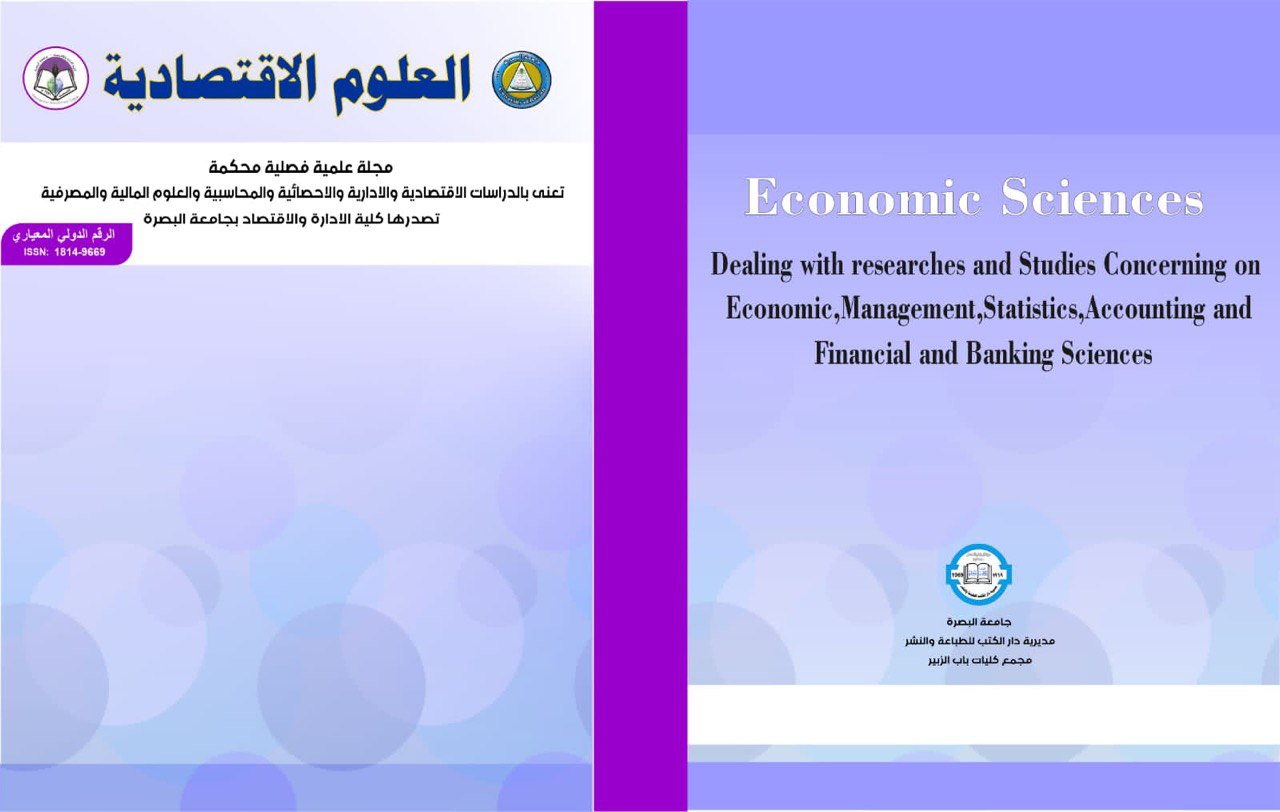Abstract
Oil revenues play a prominent role in the Iraqi economy, representing a significant portion of the country's gross domestic product (GDP). However, governance issues have negatively impacted Iraq's ability to utilize this valuable resource optimally, due to mismanagement of funds, corruption, and conflicts over revenue distribution. Governance has not been given the sufficient importance it deserves, despite its vital role in ensuring the effective use of oil revenues for the benefit of the people. Data demonstrates the substantial dominance of oil revenues in the Iraqi economy, accounting for over 96% of general government revenues, making the economy vulnerable to fluctuations in the global oil market.
Furthermore, Iraq lacks an effective economic policy, particularly concerning the oil sector as the main source of income, leading to a consumption-driven economy and negative effects on competitiveness and local production. Data also indicates the failure to implement international governance standards in Iraq, resulting in low levels of governance indicators.
Despite the importance of sovereign wealth funds in achieving economic stability and mitigating the "resource curse," Iraq has not recognized the significance of these funds and has not taken the necessary steps to establish them, leaving the economy vulnerable to sharp fluctuations in oil prices. Finally, the research highlights the necessity of diversifying the Iraqi economy and focusing on establishing sovereign wealth funds, linking their establishment to comprehensive economic and political reforms to address structural imbalances in the Iraqi economy, with the aim of achieving sustainable economic development.
Furthermore, Iraq lacks an effective economic policy, particularly concerning the oil sector as the main source of income, leading to a consumption-driven economy and negative effects on competitiveness and local production. Data also indicates the failure to implement international governance standards in Iraq, resulting in low levels of governance indicators.
Despite the importance of sovereign wealth funds in achieving economic stability and mitigating the "resource curse," Iraq has not recognized the significance of these funds and has not taken the necessary steps to establish them, leaving the economy vulnerable to sharp fluctuations in oil prices. Finally, the research highlights the necessity of diversifying the Iraqi economy and focusing on establishing sovereign wealth funds, linking their establishment to comprehensive economic and political reforms to address structural imbalances in the Iraqi economy, with the aim of achieving sustainable economic development.
Keywords
Economic Diversification.
Iraqi Sovereign Fund
oil governance
Oil revenue governance
oil sector governance
revenue and transparency
Abstract
عائدات النفط دورًا بارزًا في الاقتصاد العراقي، حيث تشكل جزءًا كبيرًا من الناتج المحلي الإجمالي للبلاد. ومع ذلك، فإن قضايا الحوكمة قد أثرت سلبًا على قدرة العراق على استخدام هذا المورد القيم بشكل أمثل، نتيجة لسوء إدارة الأموال والفساد والصراع على توزيع الإيرادات. لم تُعطَ الحوكمة الأهمية الكافية التي كانت تستحقها، على الرغم من أنها تلعب دورًا حيويًا في ضمان استخدام العائدات النفطية بشكل فعال لصالح الشعب. تُظهر البيانات الهيمنة الكبيرة للعوائد النفطية في الاقتصاد العراقي، حيث تمثل هذه العوائد أكثر من 96% من إيرادات الحكومة العامة، مما يجعل الاقتصاد عرضةً لتقلبات سوق النفط العالمية.
بالإضافة إلى ذلك، يفتقر العراق إلى سياسة اقتصادية فعالة، خاصة فيما يتعلق بالقطاع النفطي كمصدر رئيسي للدخل، مما أدى إلى هيمنة استهلاكية في الاقتصاد وتأثير سلبي على التنافسية والإنتاج المحلي. كما تشير البيانات إلى فشل تطبيق معايير الحوكمة الدولية في العراق، مما يؤدي إلى مستويات منخفضة في مؤشرات الحوكمة.
على الرغم من أهمية صناديق الثروة السيادية في تحقيق استقرار اقتصادي وتخفيف تأثير "لعنة الموارد"، إلا أن العراق لم يدرك أهمية هذه الصناديق ولم يتخذ الخطوات اللازمة لإنشائها، مما يترك الاقتصاد عرضةً للتقلبات الحادة في أسعار النفط. وأخيرًا، يشير البحث إلى ضرورة تنويع الاقتصاد العراقي والتركيز على إنشاء الصناديق السيادية، وربط إنشائها بإصلاحات اقتصادية وسياسية شاملة لمعالجة الاختلالات الهيكلية في الاقتصاد العراقي، بهدف تحقيق متطلبات التنمية الاقتصادية المستدامة
بالإضافة إلى ذلك، يفتقر العراق إلى سياسة اقتصادية فعالة، خاصة فيما يتعلق بالقطاع النفطي كمصدر رئيسي للدخل، مما أدى إلى هيمنة استهلاكية في الاقتصاد وتأثير سلبي على التنافسية والإنتاج المحلي. كما تشير البيانات إلى فشل تطبيق معايير الحوكمة الدولية في العراق، مما يؤدي إلى مستويات منخفضة في مؤشرات الحوكمة.
على الرغم من أهمية صناديق الثروة السيادية في تحقيق استقرار اقتصادي وتخفيف تأثير "لعنة الموارد"، إلا أن العراق لم يدرك أهمية هذه الصناديق ولم يتخذ الخطوات اللازمة لإنشائها، مما يترك الاقتصاد عرضةً للتقلبات الحادة في أسعار النفط. وأخيرًا، يشير البحث إلى ضرورة تنويع الاقتصاد العراقي والتركيز على إنشاء الصناديق السيادية، وربط إنشائها بإصلاحات اقتصادية وسياسية شاملة لمعالجة الاختلالات الهيكلية في الاقتصاد العراقي، بهدف تحقيق متطلبات التنمية الاقتصادية المستدامة
Keywords
حوكمة العائدات النفطية ، حوكمة القطاع النفطي، الإيرادات والشفافية، صندوق العراق السيادي ،حوكمة النفط، التنويع الاقتصادي.
